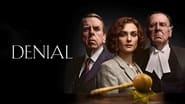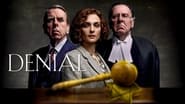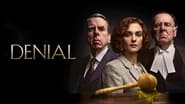Jeanskynebu
the audience applauded
Erica Derrick
By the time the dramatic fireworks start popping off, each one feels earned.
Haven Kaycee
It is encouraging that the film ends so strongly.Otherwise, it wouldn't have been a particularly memorable film
kitellis-98121
An extremely well executed drama, without a single pointless or wasted scene. No part of this production drew attention away from the story - which was focused on with laser intensity - so although the cinematography was excellent and atmospheric, there was no flashy camerawork or eye-catching visuals; nor did the music ever overwhelm the dialogue or leave you humming a prominent leitmotif; and the editing was crisp, straightforward, and business-like.The performances were uniformly exquisite, with each actor playing their role with subtlety, nuance, and verisimilitude. There were plenty of opportunities for hammy moments, but to their credit, and the credit of the director, each actor played their part with skilful restraint. In the more emotional scenes, their passions seethed mostly beneath the surface, which all added to the emotional investment of the viewer, forced on occasion to experience the enormity of events far more than if everything had been done for them by the actors. This is a sign of truly skilful and confident directing, as well as a rare example of a modern movie trusting its audience to think and feel what they are meant to, without leading them round by the nose.Overall, this was a thoroughly satisfying viewing experience, that left just the right cocktail of aftertastes on the intellectual/emotional palate.From the number of negative reviews of this film, and its low IMDB rating, I can only conclude that there are still a worrying number of anti-Semites and holocaust deniers out there, as there is very little in it to complain about technically or creatively.
glynrh
I thought the film was extremely well written and acted brilliantly by all of the five main players. In fact Spall was outstanding.
In the hands of another director or producer, the film could have easily significantly longer. More time telling the story of the Holocaust, a longer build up before the trial and so on. However, it cut to the chase, made a point and moved on. Each character was developed sufficiently to understand their individual role in the piece. The law including the burden of proof, was made easily digestible for non lawyers. Over all the film was lean and got on with telling this particle story and I like that. I own this film on DVD and will watch it again.
I do not understand some of the negative reviews posted here.
This film deserved to have done far better at the box office. Quite what the problem was I am uncertain, perhaps the absence of any really big names (no offence Rachel, you played the role wonderfully, to a tee) or whether the cinema going public just does not want to see any more Holocaust related productions. If the latter, that would be sad because this film is blessed with layers and is about so much more than the Holocaust.
Oh well, Blade Runner bombed on it's first run in the cinemas 35 years ago, so maybe all is not lost!
writewheelpub
I thought that any film with Weisz, Wilkinson, Spall and Scott in it would be worth the maximum score or thereabouts for me but somehow Denial, despite its subject matter being something I view as important, missed the target.The acting was superb. Andrew Scott especially so. I've met a few lawyers in my time and of a type, Scott's Julius rang so very true. So many of the occupants of the Inns of Court are admirable but weird that all Scott had to do for the characterisation was to walk around one for a while.In the same manner Wilkinson hit the self confident and rather superior barrister spot on. There was a certain conceit that was delightfully communicated. Spall all but turned Irvine into a grotesque and in real life the opposite is true, and part of Irvine's weaponry. He's not hesitant but personable, believable and convincing, that is if you don't know the facts. To paint him as an unattractive failure gives the wrong message. There were glimpses of Irvine's way with words, but not enough. He ended up as someone almost pitiable when in fact he's dangerous. Weisz is such a good actress that one must consider that she was obliged to turn Lipstadt into such an unattractive character. I ended up not liking her. (Sorry to the real Lipstadt, I'm sure you are a lovely person who is sympathetic to the needs and desires of others.) I know that feminism rules, but lawyering is complex and the suggestion that the team listened to her for tactics seemed rather unbelievable. I'm not sure that holocaust denial should be an offence. All aspects of history have their contrarians, not to mention those who twist facts to suit their political prejudices, so making a special case, albeit out of something that is rather special, out of holocaust denial is questionable. Perhaps not in Germany as I can see why they feel the option is the better one.The libel laws in the UK seem to be merely a method of enriching the lawyers, but then the systems in the USA have the same emphasis so why make it into a big thing?Using dialogue from the court records is a cop out. It is normally boring, repetitive and vague. Did anyone believe that A Few Good Men showed how a court ran?We should not forget the horrors of the extermination camps but, unfortunately, we will. It will be a footnote in history in a few years. There was a better film to make on the subject, and with such a front row perhaps should have been made.So much for the negatives: the film is still well worth watching, if only for Scott, and is worth the cost of the DVD, but one can't help but regret the much better film that was missed. The Auschwitz scenes were well done although it would be hard not to make them heartrending and emotional. There were certain aspects that were important for the plot and these were rather laboriously covered, but then, I suppose, we'd moan if they had not been mentioned. All in all 7 is a little harsh, but 8 is beyond reach.
rogerdarlington
When British history writer David Irving sued for libel the American historian and academic Deborah Lipstadt, because she had accused him of being a Holocaust denier, I assumed that he had no chance of winning and that, having been defeated in a court of law, the cause of Holocaust denial would be irredeemably damaged. I was wrong on both scores which is why, 17 years after the trial, it is so important that this big name film about the case has been made.As the film makes clear, Irving's defeat was far from certain because, in an English libel case, the defendant has to prove the veracity of the offending material and an important part of the price paid by the defence was that neither Lipstadt nor Holocaust survivors were called to testify so that Irving, who conducted his own case, could not exploit them. The film is released at a time when social media online and Trump in the White House are giving extraordinary prominence to falsehoods in an era which has been dubbed "post-truth".The Holocaust happened and, if this film helps to remind people of this incontrovertible fact, it will make a valuable contribution to evidence-based discourse. The main problem for such a cinematic work of less than two hours is that the case was so prolonged and complex. It ran for five years (2000-2005) and, when it came to trial, it went on for 32 days and ended with a judgement of 355 pages. A further problem is that the viewer always knows the outcome, which inevitably diminishes the tension of the narrative, although director Mick Jackson and writer David Hare do their best to build up a sense of uncertainty. So, as a film, this is never going to be a crowd-pleaser.But it tells an important story about an issue of huge historical significance and it does it with a roster of fine British actors. Rachel Weisz (herself Jewish) is the feisty Lipstadt and Timothy Spalling is convincing in the unsympathetic role of Irving, while Tom Wilkinson is formidable barrister Richard Rampton and Andrew Scott is cerebral solicitor Anthony Julius. Some of my Jewish friends feel that the film is unfair to the British Jewish community, but a good deal of research went into this work and every word that Irving utters during the screen version of the trial is taken verbatim from the court records.





